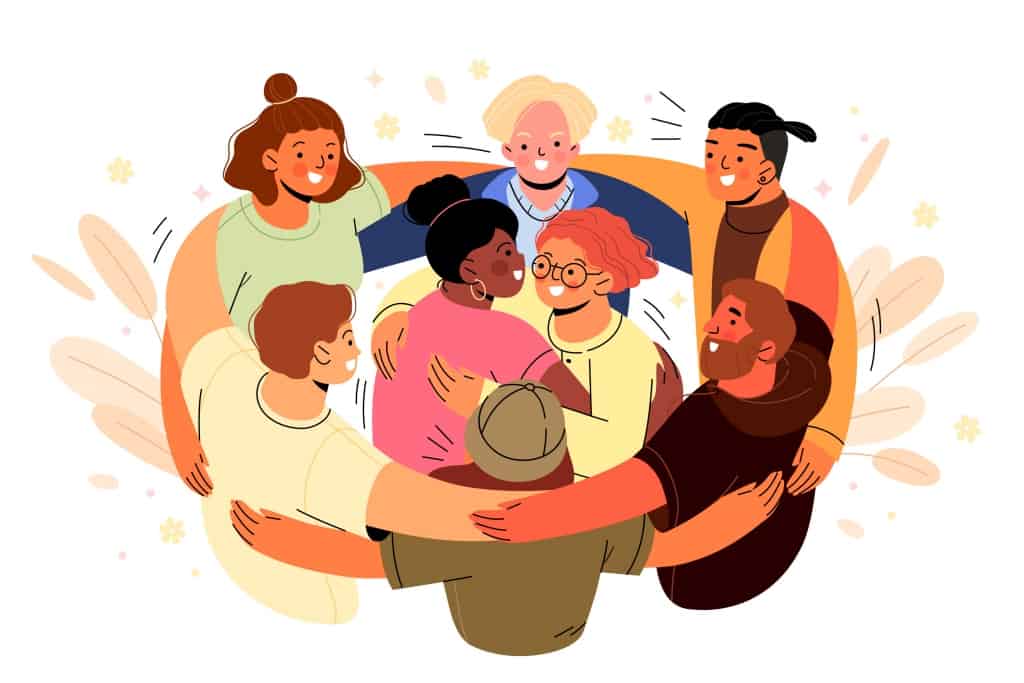Respect in the Workplace isn’t just a policy; it’s a powerful tool that shapes company culture and impacts everyone’s experience. It’s all about recognizing the worth of each individual, regardless of their position or role.
In this blog post, we'll dive into what respect in the workplace really means, why it's a fundamental ingredient and simple ways to weave it into your daily routine. Whether you're a professional or just a new hire, these insights will help you create a positive and respectful atmosphere that benefits everyone.
Table Of Contents
- What is Respect in the Workplace?
- Why Respect is Important in the Workplace?
- Examples Of Respect in the Workplace
- How Do You Show Respect in the Workplace?
- Final Thoughts

Tips For Better Engagement

Looking for a way to engage your teams?
Get free templates for your next work gatherings. Sign up for free and take what you want from the template library!
🚀 Get templates for free
What is Respect in The Workplace?
Respect in the workplace is treating others the way you'd want to be treated. It means valuing each person's thoughts, feelings, and ideas, no matter their job title or background.
When you show respect, you create a friendly and comfortable atmosphere where everyone feels included and appreciated. It means listening carefully when others talk, considering their opinions, and being polite and kind in your interactions.
Why Respect is Important in the Workplace?
Respect in the workplace is incredibly important for several reasons:

It's Ethical:
Ethical standards are like the rules for doing what's right, and respect is a big part of those rules. By treating others well, you're not only showing respect – you're also contributing to a solid ethical foundation for your workplace. It's like putting together the pieces of a puzzle to create a picture of a respectful and ethical organization.
It creates a Positive Work Environment:
When respect is present, the workplace becomes a more pleasant and comfortable space. Your team members are happier to come to work, and this positive atmosphere can boost morale and job satisfaction.
In addition, in a respectful workplace, people are more likely to share their ideas and opinions. They're not afraid that others will shoot them down. This openness brings in fresh ideas and solutions that contribute to a positive atmosphere.
It Reduces Conflicts:
Respectful behavior helps prevent conflicts. When respect in the workplace is present, you can't jump to conclusions or get angry right away. You stay calm and try to find solutions instead of adding fuel to the fire. This calmness helps prevent minor disagreements from blowing up into big fights.
It Boots Productivity:
Respect isn't just a nice feeling – it's a turbocharger for productivity. When you're respected at work, you're more motivated, focused, and dedicated. It's like having a secret ingredient that turns regular work into outstanding achievements.
So, by showing respect and creating a respectful workplace, you're not only making colleagues feel valued but also fueling a drive for excellence and increased productivity.
Examples Of Respect in the Workplace
Here are some specific examples of how you can demonstrate respect for colleagues in the workplace:
- Listening to others without interrupting
- Valuing others' opinions, even if you disagree with them
- Being considerate of others' feelings
- Avoiding gossip and backbiting
- Giving credit where credit is due
- Acknowledging others' contributions
- Apologizing when you make a mistake
- Being open to feedback
- Being willing to learn from others
Check Your Team's Well-being with a Pulse Check
Healthy employees lead to an engaging, inspiring, and motivating atmosphere in the workplace. Grab our free template below👇

How Do You Show Respect in the Workplace?
#1 - Recognize Personal Boundaries
Think of personal boundaries as invisible lines that people draw around their private lives. Just like you'd want your privacy respected, your colleagues appreciate it when you respect theirs.
- Privacy Matters: Respecting personal boundaries means giving them space to keep some things private.
- Professionalism Counts: Keeping conversations focused on work-related topics shows that you take your job seriously. It also sets a professional tone and helps maintain a productive atmosphere.
- Ask Before Sharing: If someone shares something personal with you, it's a sign of trust. If they haven't shared, it's best not to spread their personal matters to others.
- Focus on Common Interests: If you want to connect with colleagues, try discussing neutral topics like hobbies or shared interests. This keeps conversations friendly and comfortable.

#2 - Listen Carefully
Listening carefully is like giving someone your full attention and saying, "I'm here for you". It's a way to show that their thoughts matter and that you genuinely care about what they're saying.
By being a good listener, you're building strong connections, avoiding misunderstandings, and making the workplace a respectful and friendly place.
#3 - Use Polite Language
Saying "please" and "thank you" isn't just about manners – it's about showing appreciation and respect in the workplace for others. It's a simple way to brighten someone's day and create a workplace where everyone feels valued.
So, don't forget those magic words; they hold the power to turn ordinary interactions into moments of kindness and gratitude.
#4 - Value Others' Time
Have you ever waited for someone who's running late? It can feel a bit frustrating, right? Being on time is like giving a gift of respect to others, showing that you value their time just as much as your own.
By valuing punctuality, you're contributing to a workplace where meetings start on time, appointments are respected, and everyone's time is treated with consideration.
#5 - Accept Differences
Embrace diversity and be open to different viewpoints. It shows you value different perspectives. Also, embracing diversity challenges stereotypes and biases. It shows that you're willing to look beyond preconceived notions and get to know people for who they truly are.
#6 - Apologize When Necessary
Apologizing is like a small act with a big impact. It's about taking responsibility for your actions, showing respect for others, and being willing to make things right. By apologizing when needed, you're contributing to a workplace where honesty and accountability are valued.
#7 - Be Empathic
Empathy is like wrapping someone in a warm blanket of understanding. It's about caring for others' feelings and showing that you're here for them, no matter what. Here's a simple guide on how to cultivate empathy:
- Put Yourself in Their Shoes: Imagine what it's like to be in their situation. How would you feel if you were going through what they are?
- Validate Their Feelings: Let them know their emotions are valid. You can say, "I understand how you feel" or "It's okay to feel that way."
- Practice Non-Judgment: Avoid judging or criticizing their feelings. Everyone's experiences are different.
- Avoid Offering Solutions Right Away: Sometimes, people just need someone to listen and understand. Wait until they ask for advice before offering solutions.
- Avoid Comparisons: While sharing personal experiences can be helpful, avoid saying, "I know exactly how you feel." Each person's experience is unique.
- Practice Self-Reflection: Reflect on your own feelings and experiences to better understand the emotions of others.

Final Thoughts
The value of respect in the workplace cannot be underestimated. It serves as the cornerstone of a thriving and harmonious professional environment, where individuals are empowered to bring their best selves to the table.
Just as respect encourages open dialogue and values different perspectives, AhaSlides enables real-time interaction, making every participant an integral part of the discussion. Through live polls, word cloud, and interactive Q&A sessions, AhaSlides promotes a culture of active involvement and inclusive decision-making, where everyone's opinions hold weight.
So, let's create workplaces that are not only productive but also nurturing and respectful.
Frequently Asked Questions
What are 5 ways to show respect?
1. Listen actively without interrupting when others are speaking.
2. Be on time for meetings and commitments.
3. Keep an open mind.
4. Take ownership of your mistakes.
5. Be considerate with feedback - if you're giving feedback to someone, do it privately instead of publicly humiliating them.
How do you show respect in the workplace examples?
- Greet coworkers respectfully every day with a friendly hello or good morning. Make eye contact and smile.
- Address people by their preferred names and titles. Don't shorten names without permission.
- Be polite in all communications such as emails, memos, requests etc. Say please, thank you, excuse me as needed.
- Keep an open mind during disagreements. Hear others out fully before rebutting.








